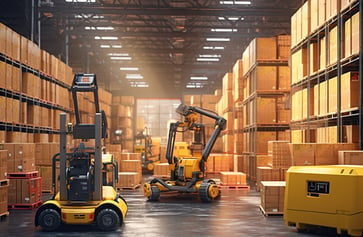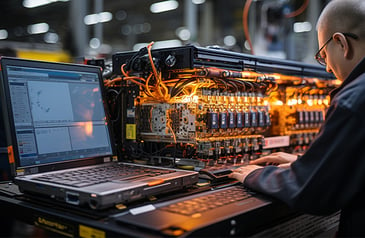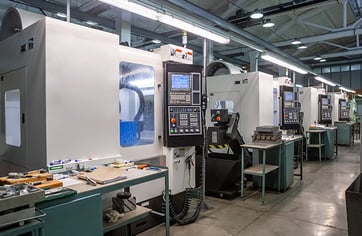 Industrial automation has revolutionized manufacturing and production processes across various industries. Different forms of automation technologies play crucial roles in enhancing efficiency, precision, and control. In this blog, we'll explore four key types of industrial automation: Robotics, PLCs (Programmable Logic Controllers), SCADA (Supervisory Control and Data Acquisition) systems, and CNC (Computer Numerical Control) machines, along with their applications.
Industrial automation has revolutionized manufacturing and production processes across various industries. Different forms of automation technologies play crucial roles in enhancing efficiency, precision, and control. In this blog, we'll explore four key types of industrial automation: Robotics, PLCs (Programmable Logic Controllers), SCADA (Supervisory Control and Data Acquisition) systems, and CNC (Computer Numerical Control) machines, along with their applications.
Types of Industrial Automation: Robotics, PLCs, SCADA Systems, and CNC Machines
- Robotics

Robotics involves the use of programmable machines equipped with sensors, actuators, and control systems to automate tasks and operations.
Applications:
- Manufacturing: Robots are used for tasks such as assembly, welding, painting, and material handling in industries like automotive, electronics, and aerospace.
- Packaging: Robots are employed in packaging and palletizing processes, ensuring accuracy and speed in product handling.
- Pharmaceuticals and Healthcare: Robotic arms are used for precision tasks in pharmaceutical manufacturing and surgery.
- Logistics and Warehousing: Automated guided vehicles (AGVs) and robotic systems assist in material transportation and order fulfillment.
Recommended Cables: Choose cables designed for continuous flex, exceptional torsion resistance, and compatibility with cable carriers.
2. PLCs (Programmable Logic Controllers)
 PLCs are specialized digital computers used to control industrial machinery and processes.
PLCs are specialized digital computers used to control industrial machinery and processes.
Applications:
- Manufacturing Automation: PLCs control production lines, machinery, and conveyor systems for precise and synchronized operations.
- Water Treatment: PLCs are used in water and wastewater treatment plants to automate processes like chemical dosing, filtration, and pumping.
- HVAC Systems: They control heating, ventilation, and air conditioning systems for energy efficiency and comfort.
- Food Processing: PLCs manage food processing equipment, ensuring consistency and safety in food production.
Cable Recommendations: Choose cables with protective shielding, reduced diameters and compatibility with circular and rectangular connectors.
- SCADA (Supervisory Control and Data Acquisition) Systems:
 SCADA systems provide real-time monitoring, control, and data acquisition of industrial processes.
SCADA systems provide real-time monitoring, control, and data acquisition of industrial processes.
Applications:
- Energy Management: SCADA systems monitor and control power generation, distribution, and consumption in utilities and substations.
- Oil and Gas: They oversee drilling, refining, and distribution processes, ensuring safety and efficiency.
- Manufacturing: SCADA systems track and optimize production processes, minimizing downtime and waste.
- Transportation: SCADA is used for traffic management, railway systems, and monitoring infrastructure like bridges and tunnels.
Cable Recommendations: Opt for cables that possess TC-ER (Tray Cable Exposed Run) ratings, excellent chemical resistance, and superior heat tolerance capabilities.
- CNC (Computer Numerical Control) Machines:
 CNC machines are automated manufacturing tools controlled by computer programs.
CNC machines are automated manufacturing tools controlled by computer programs.
Applications:
- Metalworking: CNC machining centers are used for precision cutting, milling, and drilling in industries such as aerospace and automotive.
- Woodworking: CNC routers automate carving, engraving, and shaping tasks in furniture and cabinetry.
- 3D Printing: CNC technology is applied in 3D printing and additive manufacturing for prototyping and production.
- Medical Devices: CNC machines are used to manufacture medical implants and devices with high precision.
Recommended Cables: Opt for cables that boast exceptional durability against abrasion and chips, and compatibility with motors and VFDs. Additionally, consider control cables with high conductor counts to optimize the total quantity of cables being routed
These four types of industrial automation—robotics, PLCs, SCADA systems, and CNC machines—have diverse applications across industries, contributing to increased productivity, quality, and safety. With the rapid progression of technology, the integration and synergy of automation technologies will lead to increasingly efficient industrial processes.
Industrial wire and cable are essential components of industrial automation systems, playing a crucial role in ensuring the reliable and efficient operation of machinery and processes. Selecting the right industrial cables and maintaining them properly is essential for optimizing the performance and longevity of industrial automation systems. Reach out to us today for assistance in enhancing your wire and cable requirements for your automation industry demands.


